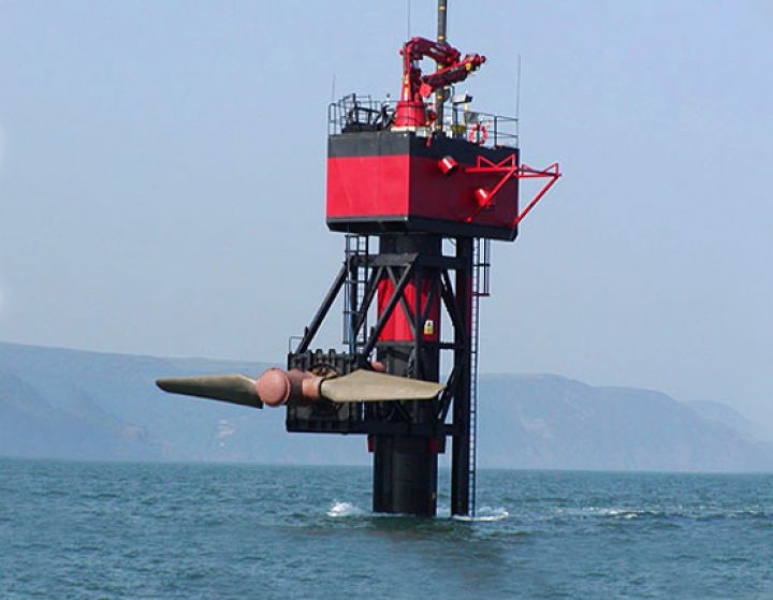Understanding the complexity of tidal resources in New Zealand’s coastal waters and examining how extracting tidal energy would influence and be influenced by this variability.
The problem
Our economy has relied on fossil fuels for many years, but there now more competition for these resources and a need to switch to cleaner energy. Tidal energy has the potential to provide a great deal of power for New Zealand, but we don't know enough about the variability in coastal flows beyond the basic tidal components. We also don’t have a strong understanding of how tidal energy developments may affect this flow.
The aim of this research is to enhance the economic and environmental viability of an emerging renewable energy – tidal stream power. The efficient extraction of energy from tidal systems and the identification of impacts requires good knowledge of the actual flows and the variability in those flows.
The solution
Key steps involve determining actual tidal resource and its variability, followed by quantification of how the performance of a single turbine is influenced by turbulence, and then scaling this up in conjunction with developers to determine the most effective way of distributing an array of turbines with the least impact. Thus, the approach in this new project is to:
- develop a sound picture of flow variability
- understand how individual devices behave in such an environment, and then
- determine the physical impact of a farm of such devices.
The work will involve observations of actual flow patterns and variability in space and time, as well as numerical models at two scales. The larger of the two scales will seek to understand tidal variability and the other drivers of flow in the coastal environment. The smaller of the two model scales will examine interaction between arrays of turbines and the existing flow, and how this will modify it. This will in turn influence the environmental impact as well as the overall energy production of projects.
The result
- We have successfully deployed and recovered a suite of monitoring buoys in several locations around Cook Strait. We will seek one more mooring in a key location.
- We have conducted a limited amount of turbulence measurement work. We will seek to further expand this data set in coming voyages.
- We have commenced re-analysis of previous voyages to Cook Strait to look at the current variability there.
- We have entered into discussions with two developers to better understand their challenges and explain to the sorts of issues they will have to deal with.
- A PhD student has commenced work on the project looking at the interaction with turbulence of arrays of turbines. Tim Divett has been awarded the prestigious Todd Energy PhD Fellowship to aid his work and has also recently been awarded a scholarship to attend an energy summer school in the UK.
Media
Stevens C. "waves " Discussion with Bryan Crump on Radio NZ - broadcast 29 nov 2009. http://podcast.radionz.co.nz/ngts/ngts-20091029-2045-Salty_Water_Oceans-048.mp3
Stevens C. "Internal Tides" Discussion with Bryan Crump on Radio NZ - broadcast 17 Sep 2009. http://podcast.radionz.co.nz/ngts/ngts-20090918-2045-Salty_Water_Oceans-048.mp3
Stevens C. "Tides" Discussion with Chris Whitta on Radio NZ - broadcast 6 Aug 2009. http://podcast.radionz.co.nz/ngts/ngts-20090806-2045-Salty_water_-_Tides-048.mp3
Stevens C. "Thermohaline circulation" Discussion with Bryan Crump on Radio NZ - broadcast 25 June 2009. http://podcast.radionz.co.nz/ngts/ngts-20090625-2045-Salty_Water-048.mp3
Stevens C. "Arctic ice decline" Discussion with Bryan Crump on Radio NZ - broadcast 14 May 2009. http://podcast.radionz.co.nz/ngts/ngts-20090514-2045-Salty_Water-048.mp3
Stevens C. "Salty Oceans" Discussion with Bryan Crump on Radio NZ - broadcast 2 April 2009. http://podcast.radionz.co.nz/ngts/ngts-20090402-2045-Salty_Water_-_oceans-048.mp3
Stevens C. “Cook Strait” Discussion with Bryan Crump on Radio NZ - broadcast 19 feb 2009. http://www.radionz.co.nz/audio/national/ngts/2009/02/19/salty_water
Stevens C., (2008) Marine energy Developments in New Zealand, Australasian Hydrographic Society AGM, June 12 2008, Wellington.
Stevens C., (2008) Marine energy environmental impacts, Presentation at AWATEA AGM, Te Papa May 29.
Stevens*, C.; Smith, M.; Gorman, R.; Popinet, S.; Walters, R. 2007. Marine Renewable Energy Research in New Zealand: A Multi-scale Perspective of Resources and Impacts, Australasian Coasts and Ports Conference, Melbourne Australia.
Stevens, C. 2008 Marine energy in New Zealand, 7×7, Wellington Town Hall, http://www.7x7nz.net/speakers2.htm August 2008.
Stevens C 2007 Gamma on Marine Energy ”Harnessing the Oceans” http://www.rsnz.org/education/gamma/HarnessOceans.pdf
Stevens, C. 2008 Marine energy in New Zealand, 7x7, Wellington Town Hall, http://www.7x7nz.net/speakers2.htm August 2008.


